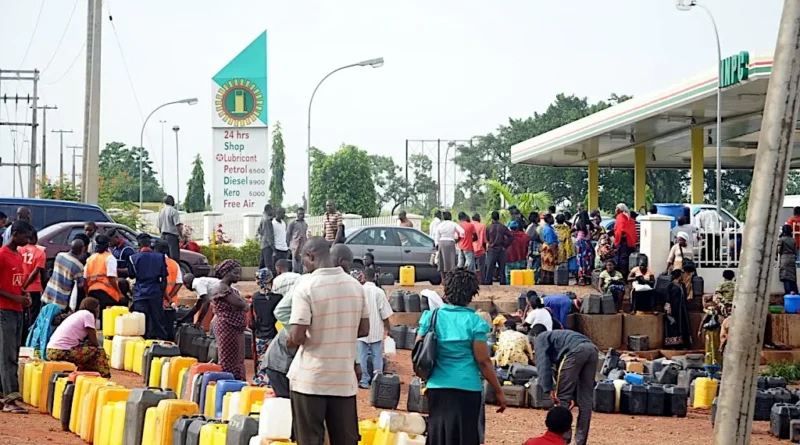Fuel Scarcity: FG initiates 15-day emergency fuel supply in response to the fuel scarcity.
Fuel Scarcity: FG initiates 15-day emergency fuel supply. With fuel scarcity becoming more severe across the country, the Federal Government has stepped up with a 15-day emergency fuel supply plan to tackle the shortage and make sure petrol is distributed fairly all over Nigeria.
This proactive measure comes in response to the growing concerns and challenges faced by citizens due to the scarcity of Premium Motor Spirit (PMS), commonly known as petrol.
The government has announced that vessels tasked with importing PMS will continue to dock at ports across the country to discharge their cargo into various depots.
From these depots, the fuel will be distributed to filling stations across the length and breadth of the nation, thereby addressing the pressing need for access to fuel in communities far and wide.
Notably, the Major Energies Marketers Association of Nigeria has issued a statement indicating that its members in strategic locations, including Apapa and other parts of Lagos, have received sizable fuel shipments amounting to 300 million litres from a fleet of eight vessels.
This influx of fuel is a welcome development amidst the prevailing scarcity.
Despite these efforts, reports indicate that long queues persist at filling stations, causing inconvenience and frustration for motorists and commuters alike.
Observations on Wednesday revealed deserted roads in states such as Ogun and Lagos, where vehicles lined up at filling stations in hopes of securing fuel.
Some individuals reported having to park their vehicles temporarily due to the unavailability of petrol.
Moreover, concerns have been raised regarding the pricing of fuel at the few stations where it remains available, with prices reportedly reaching exorbitant levels.
This has further compounded the challenges faced by ordinary citizens grappling with the impact of the fuel shortage on their daily lives and livelihoods.
In response to these concerns, Ayo Cardoso, the South-West Regional Coordinator of the Nigerian Midstream and Downstream Petroleum Regulatory Authority (NMDPRA), emphasized the government’s commitment to resolving the crisis.
Cardoso assured citizens that additional vessels carrying fuel would arrive in Nigeria over the next two weeks, signaling a sustained effort to address the shortage and facilitate the continuous distribution of petrol.
Furthermore, Cardoso reiterated that each state would receive its allocated quota of fuel, thereby ensuring a fair and equitable distribution process aimed at reducing queues and easing the burden on consumers.
This coordinated approach underscores the government’s determination to mitigate the impact of the fuel scarcity crisis and restore normalcy to the nation’s transportation and energy sectors.
“As I said earlier, there would be enough fuel across Nigeria soon. We have received over 300 million litres as of Tuesday. More have arrived as we speak, but I can’t give you the figure. Vessels will keep arriving in Nigeria for 15 days, which started counting on Monday, and we will keep distributing the product across the nation.
“The masses should not panic; all these will soon vanish. We are not prioritising anywhere, each state has its allocation to be delivered accordingly,” Cardoso stated.
As fuel scarcity persists, many residents in Ogun State were forced to resort to trekking as transport fares soared due to the ongoing fuel crisis.
With more filling stations shutting down and commercial drivers struggling to access fuel, commuters faced challenges in finding transportation, leading to a surge in trekking and a decrease in vehicular movement.
Students from various educational institutions also faced disruptions, with some choosing to stay home due to the high cost of transportation caused by the fuel shortage.
Observations around Abeokuta revealed fewer cars on the roads and long queues at bus stops as commuters waited in vain for available vehicles.
Mrs. Adeyemi Oni, a traveler, expressed frustration over the situation and urged swift action from government authorities to address the crisis.
“Many things are happening as a result of this fuel scarcity. The poor are now poorer and hungrier because they can’t even get to where they work due to high transport fares and lack of vehicles on the road. I can only appeal to the government to do something urgently,” he said.
Kazeem Aderemi, a motorist, informed PUNCH that he had been waiting in line at the NNPC filling station on MKO Abiola Way for several hours. The PUNCH observed that only one station along Ikotun-Igando Road was selling PMS at the time of the report on Wednesday.
God’s Decision outlet on Governor’s Road in Ikotun sold fuel at N999 per liter, while other stations like NNPCL, Mobile, and NIPCO remained closed, with motorists unwilling to leave the queues.
At Total filling station beside Isolo General Hospital, fuel was priced at N580 per liter, and Jezco filling station along Chemist Bus Stop sold fuel at N660 per liter.
TechnOil at Ire-Akari junction was selling fuel at N560 per liter, but had a long queue of motorists.
Black market sellers near the NNPC junction were offering PMS between N1,000 and N1,200 per liter.
Mobil filling station along Palm Avenue towards Mushin sold fuel at N565 per liter, while black market vendors near the NAHCO Bus Stop sold between N1,000 and N1,500 per liter on the highway.
Recommended reading: New Minimum Wage will be implemented from May 1st, 2024 – FG




